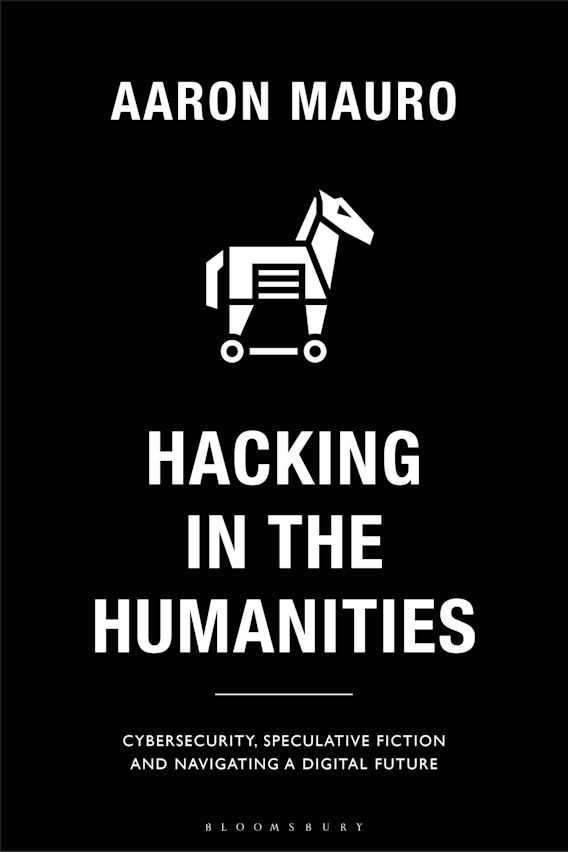AARON MAURO
Hi, my name is Aaron Mauro.
I’m a researcher, developer & teacher.
About me

I’m Associate Professor of Digital Media at Brock University in the Department of Digital Humanities. I teach on topics relating to digital culture, natural language processing, and interactive media.
I’ve published articles on U.S. literature and culture, which have appeared in Modern Fiction Studies, Mosaic, and Symploke among others. I have also published on issues relating to digital humanities in both Digital Studies and Digital Humanities Quarterly.
My latest book is called The Language of Cyber Attacks: A Rhetoric of Deception and is available from Bloomsbury. My previous book is called Hacking in the Humanities: Cybersecurity, Speculative Fiction and Navigating a Digital Future and was published by Bloomsbury in 2022.
Publications
The Language of Cyber Attacks: A Rhetoric of Deception
Many cyberattacks begin with a lure: a seemingly innocent message designed to establish trust with a target to obtain sensitive information or compromise a computer system. The perils of clicking an unknown link or divulging sensitive information via email are well-known, so why do we continue to fall prey to these malicious messages? This groundbreaking book examines the rhetoric of deception through the lure, asking where its all-too-human allure comes from and suggesting ways in which we can protect ourselves online.
Examining practices and tools such as phishing, ransomware and clickbait, this book uses case studies of notorious cyberattacks by both cyber criminals and nation-states on organizations such as Facebook, Google, and the US Department of Defence, and in-depth, computational analyses of the messages themselves to unpack the rhetoric of cyberattacks. In doing so, it helps us to understand the small but crucial moments of indecision that pervade one of the most common forms of written communication.
ReadHacking in the Humanities: Cybersecurity, Speculative Fiction and Navigating a Digital Future
This book looks to speculative fiction, cyberpunk and the digital humanities to bring a human — and humanistic — perspective to the issue of cybersecurity. It argues that through these stories we are able to predict the future political, cultural, and social realities emerging from technological change.
Making the case for a security-minded humanities education, this book examines pressing issues of data security, privacy, social engineering and more, illustrating how the humanities offer the critical, technical, and ethical insights needed to oppose the normalization of surveillance, disinformation, and coercion. In doing so, Hacking in the Humanities argues for a wider notion of literacy, which includes the ability to write and fight the computer code that shapes our lives.
ReadSocial Knowledge Creation in the Humanities
In the humanities, the field of “social knowledge creation” has helped define how social media platforms and other collaborative spaces have shaped humanistic critique in the twenty-first century.
The essays collected in this volume represent a humanistic ethics of generosity, compassion, and care. Social knowledge creation refreshingly returns to humanist values in the age of social media, emphasizing that people matter more than networks, facts matter more than opinion, and ideas matter more than influence. As a result, the speed and scale of digital culture has challenged humanists from many disciplines to more clearly define the values of education, collaboration, and new knowledge in pursuit of human justice and equality. In short, online culture has presented a new opportunity to define how and why the humanities matter in the age of social media.
ReadRobo Poetics
This document is a collaborative project by the students of IASC 1F01. This course is the introductory course for the Interactive Arts and Science undergraduate major in the Department of Digital Humanities at Brock University. Our program is a multidisciplinary program that seeks to prepare the next generation of digital media innovators and scholars
This iteration of the course sought to explore issues related to artificial intelligence (AI). We read several short stories about AI and used the perspective granted by speculative fiction to think deeply about current trends.By the conclusion of the semester, students were able to use the TensorFlow machine learning library to train a Recursive Neural Network to generate “AI poetry” based on student selected training data.
Read Source CodeRecent projects
Implementing New Knowledge Environments (INKE)
The Implementing New Knowledge Environments Partnership is a North American-based research network with the goal of fostering open social scholarship.
Mapping Ann-Marie MacDonald (MAMM)
Mapping Ann-Marie MacDonald is a team-based, open-access, interactive, and experiential project that maps the literary geography of one of Canada’s great contemporary authors.
Research & Information Security Kit (RISK)
RISK promotes a security-first research culture by providing tools, resources, and best practices for maintaining data integrity and privacy.



